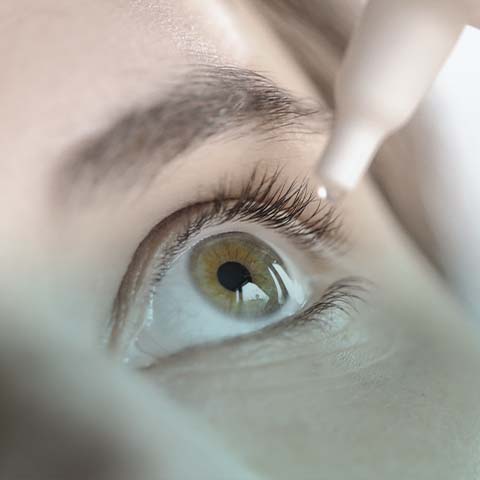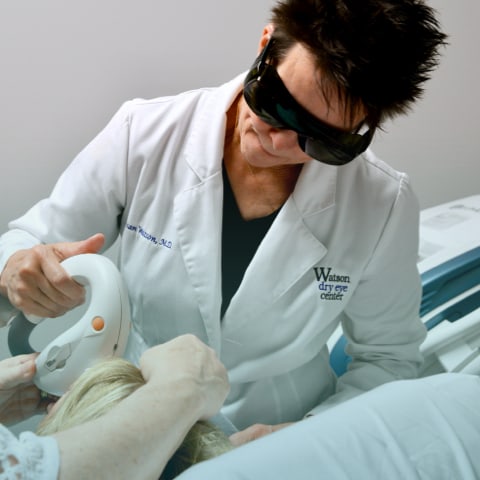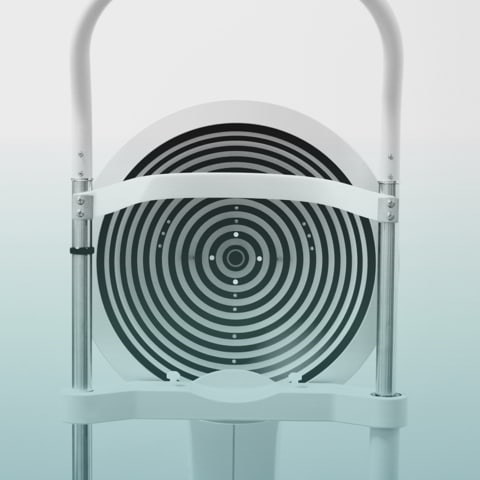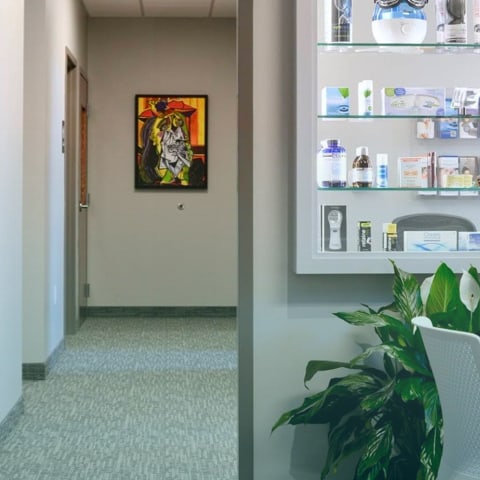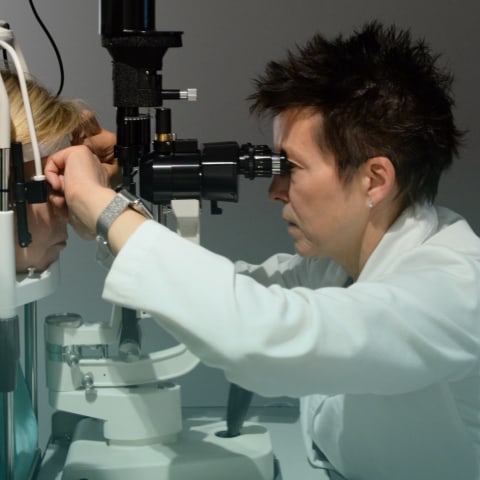
Experience Healthier Eyelids
If you have eyelids that are inflamed, irritated, and uncomfortable, you could be suffering from a condition called blepharitis.
Blepharitis can be troublesome, but our team at Watson Dry Eye Center is here to help you find relief. We can help you understand what’s causing your symptoms and get you the treatment you need.

What is Blepharitis?
Blepharitis is a common condition that can cause your eyelids to become inflamed and uncomfortable. Blepharitis commonly occurs when the tiny oil glands, called the meibomian glands, in your eye become clogged.
Unfortunately, blepharitis can lead to a number of more concerning problems, including dry eye disease.
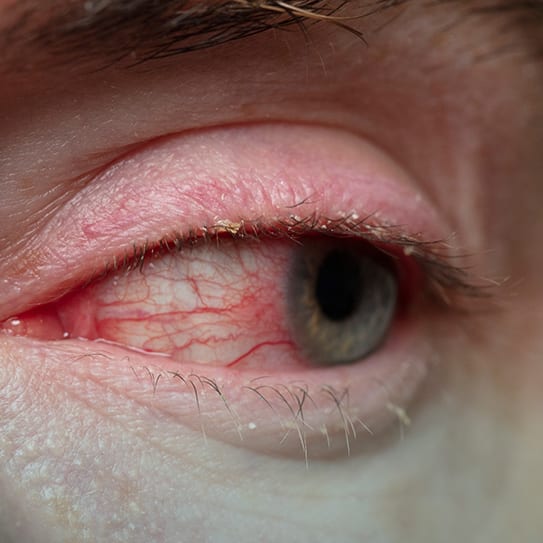

What Is Demodex?
Demodex mites naturally inhabit the hair follicles on the face and scalp, including the eyelashes and surrounding skin. In small numbers, these mites are generally harmless, but when they overpopulate, they can cause a range of symptoms, including itching, redness, and increased oil production, which can contribute to the development of blepharitis.
Treating Demodex-related blepharitis typically involves a combination of measures aimed at reducing the number of mites on the eyelids, as well as alleviating the symptoms of inflammation.

When Should I See a Doctor?
If you have blepharitis, you may experience a variety of symptoms such as:
- A gritty or burning sensation in your eyes
- Excessive tearing
- Itching, red, & swollen eyelids
- Dry eyes
- Crusting of the eyelids.
Because blepharitis symptoms are different for everyone, it’s important to be seen by a dry eye specialist to ensure you get the proper treatment.
Book an appointment with us today to see how we can help!

Blepharitis Treatment at Watson
Dry Eye Center
When you visit Watson Dry Eye Center, we will perform an in-depth assessment of your eyes to understand any symptoms you’re experiencing and determine what’s causing your blepharitis.
Once we have this information, we can recommend a treatment suited to you and your needs.
Medications
BlephEx
BlephEx is an in-office procedure that can help reduce or alleviate the symptoms associated with blepharitis.
During this 6-8 minute treatment, your doctor will gently exfoliate the lashes and eyelids to remove excess debris, bacteria, and toxins from your eyelids to bring you relief.
LipiFlow
If your blepharitis is caused by meibomian gland dysfunction (MGD), LipiFlow is an effective and efficient treatment that can help.
The LipiFlow treatment can remove any blockages in your meibomian glands, helping restore them to their normal level of function.
Intense Pulsed Light Therapy
Intense pulsed light (IPL) therapy can help patients with severe dry eye, blepharitis, ocular rosacea, or meibomian gland dysfunction.
This treatment uses light therapy to target the root causes of dry eye and reduce inflammation, leaving you more comfortable and with less severe symptoms.

Get the Treatment You Deserve
Don’t let blepharitis get in the way of living your life. Visit us at Watson Dry Eye Center to experience how our progressive treatments can help you.
Our Location
Watson Dry Eye Center is located in Raleigh, right on the corner of Forest Pines Drive and Common Oaks Drive. There’s lots of parking available right in the lot right in front of our practice.

Our Address
- Suite 120
11081 Forest Pines Dr. - Raleigh, NC 27614
Contact Us
- Phone: 252.231.0424
- Email: [email protected]
Clinic Hours
- Monday: 8:00 AM – 6:00 PM
- Tuesday: 8:00 AM – 6:00 PM
- Wednesday: 8:00 AM – 6:00 PM
- Thursday: 8:00 AM – 6:00 PM
- Friday: Closed
- Saturday: Closed
- Sunday: Closed



Help Your Teen See & Be Seen
(Comfortably)


Our teenagers are spending more time every day on their screens. Dry eye symptoms can be exacerbated by excessive screen time which is becoming increasingly common among teenagers and young adults.
Your teen doesn’t have to struggle with dry eye symptoms. At Watson Dry Eye Center, we have an incredible team that specializes in dry eye treatment and management.
Their education and social life are the center of their world and dependent on clear, comfortable vision. Allow them to focus on it with dry eye treatment.
Get ahead of dry eye by booking an appointment with our team.

See Our Google Reviews

Our Blog
Do Your Blinking Exercises
Blinking, Dry Eye DiseaseDid you know you can do blinking exercises to help prevent dry eyes? Yes, even your eyelids need exercising! Your eyelid glands are crucial to keeping your eyes well-lubricated with the proper tear film. Keeping them fit and healthy means working them regularly and properly to avoid them drying out. Why Are Blinking Exercises Important? […]
Telemedicine for Dry Eyes
Dry Eye Disease, TelemedicineWe are proud to offer telemedicine services for our patients at Watson Dry Eye Center in Raleigh, NC. Convenient, affordable, and secure, it allows patients to connect with us more easily and safely. While Telemedicine may not be appropriate for all services, we recommend it as an alternative to in-office exams when seeking non-emergent eye care. Pros […]
How to Prevent Dry Eyes in Teenagers
Blinking, Dry Eye Disease, Screen Time, TeenagersIs your teenager suffering from dry eyes? You are probably spending significantly more time with your teenagers right now, so you may notice a few things: Are they glassy-eyed? Well, of course they are. They’re bored. See them rubbing their eyes? Sure. It’s Spring. They have allergies. Are their eyes red? Yep, they’ve been video gaming 4 […]
Do Your Blinking Exercises
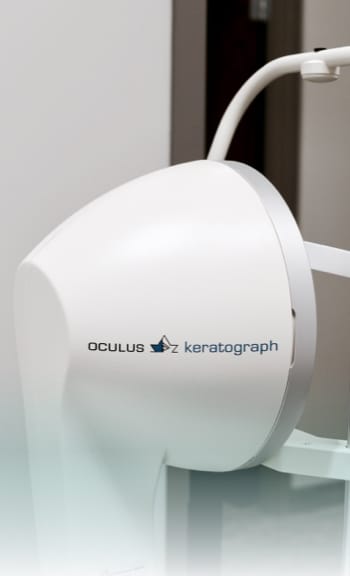
Did you know you can do blinking exercises to help prevent dry eyes? Yes, even your eyelids need exercising! Your eyelid glands are crucial to keeping your eyes well-lubricated with the proper tear film. Keeping them fit and healthy means working them regularly and properly to avoid them drying out. Why Are Blinking Exercises Important? […]
Telemedicine for Dry Eyes

We are proud to offer telemedicine services for our patients at Watson Dry Eye Center in Raleigh, NC. Convenient, affordable, and secure, it allows patients to connect with us more easily and safely. While Telemedicine may not be appropriate for all services, we recommend it as an alternative to in-office exams when seeking non-emergent eye care. Pros […]
How to Prevent Dry Eyes in Teenagers
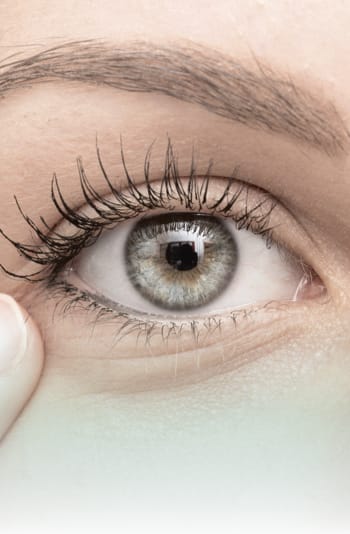
Is your teenager suffering from dry eyes? You are probably spending significantly more time with your teenagers right now, so you may notice a few things: Are they glassy-eyed? Well, of course they are. They’re bored. See them rubbing their eyes? Sure. It’s Spring. They have allergies. Are their eyes red? Yep, they’ve been video gaming 4 […]


